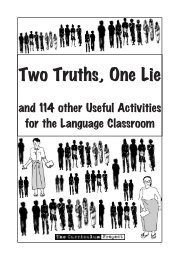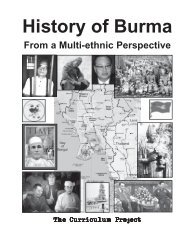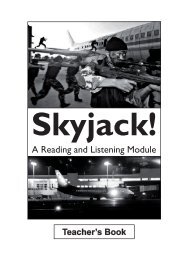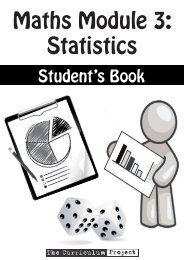Teacher's Guide - The Curriculum Project
Teacher's Guide - The Curriculum Project
Teacher's Guide - The Curriculum Project
- No tags were found...
Create successful ePaper yourself
Turn your PDF publications into a flip-book with our unique Google optimized e-Paper software.
Economic Globalisation (cont’d)Multinational (Transnational) CorporationsAsk students to read the paragraphs about ‘Multinational (Transnational)Corporations’. Ask them to write down any words that they don’t know.Elicit these words in turn. Ask if they, or other students can guess the meaning(give them some clues if necessary). If not, give them a dictionary to look itup and tell the class, or tell them yourself.<strong>The</strong> world ‘multinational’ means ‘many countries’ (‘transnational’ means ‘across countries’). A‘corporation’ is a huge company made up of a group of smaller companies.Brainstorm1. Problems and benefits of MNCs. Put students into pairs, and have themdiscuss and write down ideas for 5-10 minutes. <strong>The</strong>y should make two lists:one headed ‘problems’ and the other ‘benefits’. <strong>The</strong>n elicit ideas from eachpair in turn and write them on the board. Here are some ideas to help you:Problems: MNCs have huge economic power and can influence governments and worldeconomic institutions unfairly. <strong>The</strong>y can use their economic power to dominate and destroylocal businesses. <strong>The</strong>y can exploit natural resources in places where they are not properlyprotected. <strong>The</strong>y can exploit labour in countries where labour rights are weak. <strong>The</strong>y useclever legal and illegal strategies to avoid paying tax.Benefits:Potential benefits include the cheaper goods, employment opportunities andinvestment that MNCs can bring to a country. Also, the pay and conditions in factories runby MNCs in developing countries are often better than the ones run by local companies, andsometimes they are more careful about protecting the environment.Is economic globalisation good or bad?Ask students to read the three paragraphs about economic globalisation.Ask them to write down any words that they don’t know. Elicit these wordsin turn. Ask if they, or other students can guess the meaning. If not, givethem a dictionary to look it up and tell the class, or tell them yourself.Groupwork2. Advantages and disadvantages of economic globalisation. Draw twocolumns on the board, one called ‘Advantages’ and one called‘Disadvantages’. Divide the students into groups of 3-5. Make half thegroups ‘Advantages’ groups, and the other half ‘Disadvantages’ groups.<strong>The</strong> ‘Advantages’ groups must discuss what they think are the advantagesof globalisation and make a list. <strong>The</strong> ‘Disadvantages’ groups must do thesame for disadvantages. Give them 5-10 mins to discuss and write ideas.<strong>The</strong>n elicit one advantage from one of the ‘Advantages’ groups, and writeit down on the board in the ‘Advantages’ column. Check agreement withthe rest of the class. <strong>The</strong>n elicit one disadvantage from one of the‘Disadvantages’ groups and write it on the board in the ‘Disadvantages’column. Check agreement with the rest of the class. Continue to elicit fromeach group in turn until you have a good list.<strong>The</strong> <strong>Curriculum</strong> <strong>Project</strong> ECONOMICS: an introduction - Teacher’s <strong>Guide</strong>68













![[Eng] Nov 2012 DRAFT - The Curriculum Project](https://img.yumpu.com/45590859/1/184x260/eng-nov-2012-draft-the-curriculum-project.jpg?quality=85)


